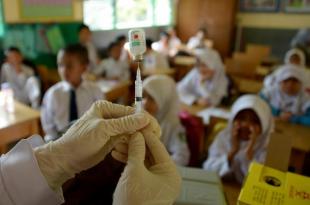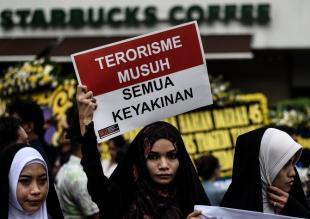JOURNAL | INDONESIA 360 by: Shinta Eka Puspasari
Health authorities across Indonesia entered 2018 by closing ranks against a Renaissance era epidemic: diphtheria. The disease, caused by bacterial infection, has spread to 29 provinces, killing at least 44 people and infecting more than 1,000 as of March. Although there were indications at the beginning of January that the number of new infections was falling, the Indonesian government is expanding a vaccination program through at least September to curb the spread of the disease.
The outbreak response immunization (ORI) campaign, launched last December, initially targeted eight million children in the Indonesian capital, Jakarta, and Banten and West Java provinces. However, as cases continued to surface at an alarming rate, President Joko Widodo ordered that the vaccination campaign be expanded to all of Indonesia’s 34 provinces. All residents aged between one and 19 in affected areas have been required to receive the vaccination, which will be given three times over a period of eight months – even those who were already properly vaccinated as children. In Jakarta, Governor Anies Baswedan ordered his health department to conduct “mandatory” vaccinations in all municipalities, after the capital saw a jump in diphtheria cases from 17 in 2016 to 109 in 2017.
Outbreak raises security concerns
The national government is racing against time to contain the spread of diphtheria as the country prepares to host the Asian Games in Jakarta and Palembang, South Sumatra Province, in August. More importantly, the government must act to counter increasing public rejection of vaccination programs, often on religious grounds, exacerbated by a vaccination scandal in 2016, in which doctors and health officials turned a blind eye for years to the manufacture and sale of multiple useless vaccines. Even with top religious institutions such as the Indonesian Ulema Council (MUI) saying there are no religious strictures against vaccinating children, it remains an uphill battle to convince the public that vaccines are essential for the benefit of the wider community.
Indonesia’s coordinating minister for political, legal and security affairs, Wiranto, has stressed that the outbreak is being treated as a security threat. He conceded the government was anticipating that some countries could advise their citizens against traveling to Indonesia due to the outbreak. Immigration checkpoints are being closely monitored to examine visitors from countries that have also reported diphtheria outbreaks.
While the Ministry of Health says the national supply of vaccines is sufficient, logistics are a problem given that far-flung regions are also affected. The Indonesian Armed Forces, National Police and Ministry of Home Affairs have been brought in to better arrange distribution. The Ministry of Communication and Informatics has been tasked with the important job of disseminating information about the disease and the national vaccination campaign.
Spike in infections
Although Indonesia had the second-largest number of reported diphtheria cases globally from 2011 to 2015, behind India, according to the World Health Organization (WHO) widespread outbreaks are relatively rare in Indonesia. The nation was declared free of diphtheria in 1990, thanks to the launch of a nationwide vaccination program. Diphtheria, a deadly upper respiratory tract illness caused by the Corynebacterium diphtheriae bacterium, can be prevented by administering the diphtheria, pertussis and tetanus vaccination to newborns.
However, cases of infection re-emerged in East Java Province in 2009, according to health ministry data. Between 2005 and 2012, 1,789 children in the province were infected with diphtheria and 91 died, as the number of children who were not inoculated rose. The government at the time blamed parents’ reluctance to get their children vaccinated, with many religious communities in East Java still questioning whether the vaccine was halal, or allowed under Islam. Some communities living in remote areas of the province were still reluctant to have their newborns properly vaccinated against a variety of illnesses.
Lower herd immunity
A 2013 health ministry survey showed a decrease in “herd immunity,” likely caused by incomplete vaccinations or no immunization. Data from the Indonesian Pediatrics Society (IDAI) reaffirms a correlation between decreasing vaccination rates in regions that record the highest numbers of diphtheria infections. The immunization rate in West Sumatra Province declined to 35 percent in 2012 from a high of 93 percent a decade earlier. The province reported two fatalities and 27 diphtheria infections in 2014. In Aceh Province, the vaccination rate tumbled to 25 percent in 2012 from 85 percent. The country’s westernmost province had a diphtheria outbreak that affected 18 people between 2013 and 2014, according to the IDAI.
While children below the age of five remain the most vulnerable during the current nationwide outbreak, the government has also found infections in persons aged above 14. Around 34 percent of the total 907 cases of diphtheria infection recorded as of December 25 were reported in the productive age bracket above 15. That compared to 47 percent of cases in the elementary school-age group (between ages 5 and 14), the ministry data showed, pointing to a lower immunity rate across the board.
Health ministry spokesman Oscar Primadi said the circumstances of the latest outbreak confirmed a trend of a wider immunity gap among society. He highlighted the surfacing of the anti-vaccination movement in recent years and its effect on herd immunity in several regions. “This rejection is among the main causes for the low vaccination rate that weakens our shield against infectious disease, including diphtheria,” Primadi said in a press release.
Anti-vaccines as act of piety
Officials have said they are aware they will face resistance to the current ORI campaign from people who refuse to let their children be vaccinated for a variety of reasons, including the belief that it is haram, or forbidden in Islam. A 2013 health ministry regulation stipulates that every child has the right to receive immunizations, but it imposes no sanctions on anyone who prevents children from getting them. The government to date has been reluctant to take stern measures against those who reject vaccinations.
The Ministry of Health asked the Ministry of Religious Affairs to help tackle the outbreak by countering arguments from groups who oppose vaccination on religious grounds. In response, Nur Syam, the secretary general of the religious affairs ministry, said the ministry was supporting every effort to tackle diphtheria, including the vaccination drive. “We hope that all citizens can accept that vaccinations must be done,” he said
The anti-vaccine movement caught the attention of the Indonesian public in mid-2017 when popular female cleric Oki Setiana Dewi said she did not inoculate her children, who at the time were hospitalized for a measles infection, due to religious beliefs. Around the same time, reports surfaced that eight Islamic primary and junior high boarding schools in Yogyakarta refused to vaccinate their students for measles, citing religious reasons. “The excuse they gave was that they doubted the halal status of the vaccines, and they said that humans already have a natural immune system,” M Lutfi Hamid, head of the health ministry’s regional representative office in the province, said at the time.
Debate was heated about the necessity to vaccinate children and newborns. Books and articles by “anti-vaxxers” alleged that immunization was part of a Western conspiracy to defeat Muslims around the world by injecting live viruses and non-halal substances into healthy babies.
The Indonesian author of one such book, Ummu Salamah – the name is likely a pseudonym – said doctors and other medical workers were collaborating to profit from treating new diseases that allegedly materialized as a result of vaccinating healthy children. One of the book’s most disturbing theories was that vaccines were made using contaminated blood, cells from aborted fetuses and animal enzymes. The author said that instead of providing medical benefits, vaccines weakened a child’s immune system, and accused vaccine producers around the world of conspiring to cover up the negative impacts of their products.
Stubborn anti-vaxxers
Teams of medical professionals have attempted to counter these myths and theories, including by using arguments based on verses from the Koran or Hadith (the books of the Prophet Muhammad’s teachings), but to little avail.
A lack of halal certification for existing diphtheria vaccines from the nation’s highest Islamic authority, the MUI, may continue to hamper efforts to convince anti-vaccination advocates to vaccinate their children. The MUI has reiterated that it supports the government’s program, stressing that Islam allows the use of vaccines that have not been declared halal, and even the use of non-halal substances during extraordinary or emergency situations.
Despite assurances from the MUI and the Indonesian Doctors Association (IDI) on the safety of the diphtheria vaccine, there are still people who reject immunization. The coordinator of surveillance and immunization at the Banten Province Health Agency, Rostina Epid, said that even after nine people died and 54 others were infected late last year, people still refused to be vaccinated. “Even after the outbreak killed many people, they still don’t want to get it,” Epid said. “I even found an infected patient who refused to be taken to the hospital because she believed it was God’s destiny and God would heal her.” Epid said her agency was working with the MUI in Banten to provide information to parents and schools, but 10 percent of Islamic boarding schools with large numbers of students refused to take part.The national government clearly must go the extra mile to overcome the continued rejection of vaccinations by Islamic community leaders and boarding schools. In addition to cooperating with the MUI, as well as large Islamic mass organizations, a more personal, one-on-one approach is clearly necessary to prevent the anti-vaxxer sentiment from spreading, increasing the nation’s vulnerability to communicable diseases.
Trust deficiency
Myths that vaccines can cause sickness and death, as well as the misguided belief that vaccines contain ingredients deemed haram, or forbidden in Islam, obviously pose a serious challenge to the country’s vaccination program. Such beliefs add to several basic obstacles to improving citizens’ well-being that must be thoroughly addressed.
While religious sentiment is indeed a major factor when it comes to public skepticism about immunization, it is not the only factor. Also to blame is the recent fake vaccine scandal that shocked Indonesia and which laid bare massive negligence, or at least incompetence, within the Food and Drug Monitoring Agency (BPOM), which has since been restructured. It was discovered that a syndicate had been distributing fake vaccines for many years, with the involvement of doctors and other health professionals. The practice had been a public secret for a long period and the issue was only taken seriously when the National Police became involved.
The case was also used by anti-vaccine groups to advance their argument that the distribution of vaccines is not sufficiently monitored, increasing the risk of contamination. Ultimately, a series of arrests were made and people were given lengthy prison terms, but the episode seriously damaged public trust in the government’s ability to monitor the provision of basic health services. It will take time and serious effort to restore this trust.
Educating parents
Another problem is the limited scope of the national vaccination program itself. The inclusion of the National Police and the Armed Forces in distributing anti-diphtheria serum is an indicator of the inability of the Ministry of Health to conduct even a regular immunization program in remote regions.
Low immunity rates, combined with a lack of medical facilities and officers in remote areas such as Papua Province, have resulted in deaths. Between May and July 2017, 31 toddlers died in Papua’s West Tigi and Deiyai districts from outbreaks of infectious diseases including measles, upper respiratory infections, diarrhea, dysentery, enterobiasis and pneumonia. Similar reports of casualties frequently surface from the province.
The secretary of Papua’s Health Agency, Silwanus Sumule, said that low immunization rates in districts were likely to blame for a measles outbreak earlier this year. The government said that as of last year the immunization rate in Papua was 73 percent. No specific data was available for Deiyai.
“Health practitioners should be more proactive,” Sumule said. “They cannot just wait for parents to visit local health centers (for immunization).”
This sheds light on another problem hindering the national vaccination program, namely parent awareness – or lack of it. The issue is multidimensional as it relates to other factors, including economic status and education levels, in addition to geography. Elizabeth Jane Soepardi, the director for health surveillance and quarantine at the Ministry of Health, says her office has found a correlation between education level and awareness of the importance of vaccines. Parents with better educational backgrounds will voluntarily inoculate their children. The real challenge, according to Soepardi, is to convince parents who only graduated from middle school.
Punishment for anti-vaxxers
The solution appears to be to make vaccinations mandatory for all citizens in order to increase herd immunity against preventable diseases, although it remains hard to see how this could be implemented effectively.
Immunization is promoted by the WHO as a cost-effective way to prevent child disabilities and fatal diseases. It also stimulates the development of health systems and represents a sound economic investment, contributing to both better health and poverty reduction.
A WHO study in September 2017 projected that vaccination programs against 10 preventable diseases between 2001 and 2020 in 73 countries, including Indonesia and other nations in Asia, Africa and Oceania, could prevent an estimated 20 million deaths, 500 million cases of illness and nine million cases of long-term disability. By 2020, immunizations since 2001 will have averted an estimated $350 billion in total costs due to illness, according to the study. Most of these costs – about $250 billion – will have been averted since 2011, of which about $240 billion represents averted productivity loss caused by premature death.
This means that Indonesia’s health ministry should start taking stern measures against parents who prevent children from being vaccinated, thereby putting themselves and society at risk of disease outbreaks that may hamper the nation’s overall development. Last September, the Italian government introduced a new regulation making childhood vaccinations compulsory for schoolchildren up to the age of 16. The regulation was approved amid a surge in measles cases – and widespread debate in Italy about whether parents should vaccinate their children against the highly contagious disease because of concerns about the vaccine’s claimed connection to autism. Under the new rule, parents face fines of up to 500 euros for failing to vaccinate their children.
While the effectiveness of the new Italian regulation is as yet unknown, it at least gives the government more ammunition to ensure the welfare of children. The Indonesian government, however, clearly needs to bolster intervention measures with massive social campaigns, in cooperation with community and religious leaders, to promote the benefits of immunization.
Shinta Eka Puspasari is an analyst for Concord Consulting in Jakarta.
 Ancient scourge exposes Indonesia's health care flaws
Ancient scourge exposes Indonesia's health care flaws  Border Five-O : Protecting Indonesia's territory
Border Five-O : Protecting Indonesia's territory  Indonesia's next terrorist fight
Indonesia's next terrorist fight